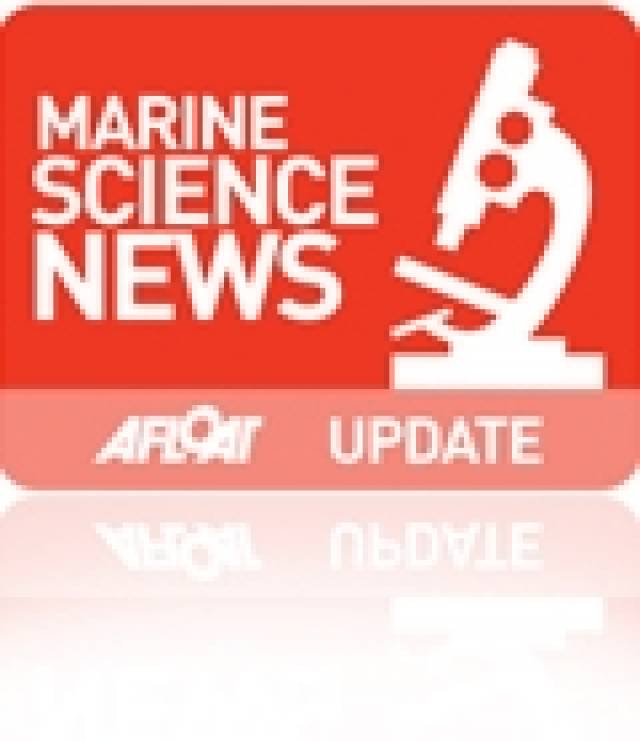#marinescience – Students of marine science from National University of Ireland, Galway (NUIG) and University College Cork (UCC) are designing and delivering their own survey onboard the RV Celtic Voyager in Cork this week as part of an accredited inter-institutional module in Multidisciplinary Offshore Operations in Marine Science, the first of its kind in Europe.
The unique module launched by the Strategic Marine Alliance for Research and Training (SMART) will provide undergraduate students with the detailed knowledge, skill sets and experience necessary to design, plan and execute a multidisciplinary marine scientific research survey. Dr Andy Wheeler, Head of Geology at UCC said: "This accredited sea going module will give participants a competitive edge in the International jobs market, as they get hands on experience working as a team to design and deliver their own survey onboard the national research vessel."
Based on a blended learning approach, teaching will be delivered using a combination of practical training onboard the national research vessel RV Celtic Voyager, classroom lectures, laboratory practical's and a suite of supporting online resources. The module was collaboratively designed and developed by experts from higher education institutes north and south of the border including Galway-Mayo Institute of Technology, National University of Ireland Galway, University College Cork and the University of Ulster with funding provided by National Digital Learning Resource (NDLR) with grant-aided shiptime provided by the Marine Institute's Sea Change programme.
Dr. Pauhla McGrane, Coordinator of SMART said: "The inter-institutional effort to produce a common blended-learning module within the SMART consortium is directly attributable to a strong, cohesive marine science community in Ireland and the common desire to collaborate on innovative forms of teaching that will ultimately benefit and add value to the student learning experience.
Dr. Martin White, lecturer in the School of Natural Sciences, NUI Galway added "The successful development and delivery of this common module by Higher Education Institutes, in association with the Marine Institute, will further strengthen existing partnerships and will facilitate the development of further synergies across the marine sector."
Dr. Peter Heffernan, CEO Marine Institute added: "This new SMART module also makes a contribution towards the achievement of key actions in the Government's Integrated Marine Plan Harnessing Our Ocean Wealth. The plan identifies the need to maintain and build capacity (people) to meet the needs of the maritime sector e.g. through tailored education and training programmes. It is also an important step towards establishing Ireland as an international marine training destination."
The module introduces students to a multidisciplinary ecosystem approach to study the marine environment using the core disciplines of oceanography, benthic ecology, fisheries biology and geosciences. Teaching will focus on the practical, cross‐disciplinary skills involved in sample acquisition and processing, deployment and operation of equipment and instrumentation and data acquisition, processing and analysis of these data. Other elements essential in carrying out research surveys at sea will be examined, including safety at sea, survey design and planning, post‐survey analysis and assessment, vessel activities and capabilities, and vessel familiarisation and orientation.
Students will also be presented with an environmental impact assessment scenario which requires them to collaborate to design a baseline survey of their own and formulate a plan to execute it. Assessment will be based on the submission of a survey report which will include data analysis and interpretation.
See www.smartseaschool.com for more information on the programme and www.ouroceanwealth.ie for the report Harnessing Our Ocean Wealth
The Strategic Marine Alliance for Research and Training (SMART is an inter-institutional marine science partnership programme designed to further develop national capacity for carrying out offshore research operations onboard research vessels for third level students of marine-related sciences.
Collaborating partners within the alliance represent key marine science departments from a broad spectrum of institutions. These include:
Cork Institute of Technology (CIT)
Galway-Mayo Institute of Technology (GMIT)
Higher Education Authority (HEA)
Marine Institute (MI)
National Maritime College of Ireland(NMCI)
National University of Ireland Galway (NUIG)
University College Cork (UCC)
University of Ulster (UU)
































































